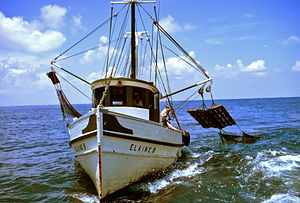SouthCoastToday posted an article on May 30th about a recent meeting in New Bedford by the New England Fishery Management Council. During the meeting seafood auction king Richie Canastra read a letter written by Captain Mark Phillips of the F/V Illusion who could not be there because he was out fishing.
The letter showed that the fishermen who are out working their trade every day understand more about the ecology and techniques of fishing than the bureaucrats at the National Oceanic and Atmospheric Administration (NOAA).
The article points out:
The shiny new federal research vessel Bigelow lies at the center of this argument. For example, fishermen who really know how to fish are consistently pointing out that the too-big Bigelow is using the wrong net, a one-size-fits-all compromise arrangement that isn’t designed to target yellowtail.
Government scientists, say the fishermen, deploy the wrong net the wrong way and then trawl too fast, with the yellowtail making their escape. The conclusion is drawn that the yellowtail aren’t down there to start with. So we cut quota.
The letter from Captain Phillips explains how the information the Bigelow collects on the yellowtail is not accurate due to the lack of actual fishing knowledge on the part of the people on the boat. The thing to remember here is that the fishermen are not attempting to over-fish–if they over-fish, they put themselves out of business. In my experience, hunters and fishermen, both professional and amateur, understand more about the ecology of wildlife than the people who want to regulate it. Education has value, but hands-on experience is needed when making decisions that impact people’s ability to make money.
The article concludes:
At the meeting last week, one person after another targeted the design of the net as a real culprit in stock assessments for yellowtail. Tellingly, no one in a position of authority, including the government scientist, uttered a word of rebuttal. They were silently confirming that what the fishermen were saying is true.
At this point there is no excuse for not having fishermen on the Bigelow as observers, the way government observers ride the fishing boats. We could also send out fishing boats to shadow Bigelow to compare results. We could even hire some of these fishing pros to do the survey work.
It makes perfect sense. It also could hurt somebody’s feelings, I’m afraid.
It’s time to bring sanity to fishing quotas.




